#bashir regime
Explore tagged Tumblr posts
Text

#sudan crisis#civil war#abdelfattah alburhan#mohamed hamdandagalo#humanitarian crisis#peacebuilding#conflict resolution#international response#regional powers#sudanese people#conflict intervention#bashir regime#military coup#political unrest#human rights#crisis management#diplomatic efforts#peace process#international community
221 notes
·
View notes
Text

#doge#assad#assad regime#bashir al assad#le overthrowing a genocidal monster has arrived#le not sure this is the best outcome though has arrived
7 notes
·
View notes
Text
Anyone who believes the ANC objects to genocide on general principles should consider this:
This is, incidentally, why I not only cannot accept that South Africa's ruling political party has discovered the concept that 'genocide is bad' is a thing it actually believes it, but that it specifically if anything has openly endorsed genocide of Black people as a point it considers an acceptable price of modern statesmanship. The Arab supremacist dictator Omar Al-Bashir, creator of the Janjaweed, was given the equivalent of a ticker tape parade and a medal for the ANC for creating an Arab supremacist-Islamist combination to slaughter the Dinka and Nuer of Darfur.
The ANC, the same people who fought so hard against white supremacy, have forgotten anything they used to stand for and the only moral principle guiding them now appears to be sheer spite.
#lightdancer comments on history#lightdancer comments on current events#darfur genocide#omar al bashir#jacob zuma#anc#aka south africa's regime founded by anti-apartheid guerrilla fighters believes oppression of Black people just fine if Arabs do it
0 notes
Text
this will be a bit of a long post but i ask that you please please read the full thing if you want to know more about Sudan- i feel like not enough people ACTUALLY know what's going on in Sudan. a lot of people have a vague idea that a 'war' and genocide is going on, but it's important to know the specifics as well.
there is extremely little coverage of Sudan from non-Sudanese sources, and even those that DO cover it often paint it as a war between two different generals for power over a country- and to a certain extent, without context, that IS what's happening. for those unaware, the two 'warring factions' in Sudan are the official Sudanese military- the SAF (Sudanese Armed Forces) and the RSF (Rapid Support Forces).
in April 2019, during the Sudanese Revolution, Islamist dictator Omar al-Bashir was deposed by the SAF in response to a mass wave of revolutionary organizing, protests, and sit-ins. Immediately after, the TMC (Transitionary Military Council) was established, with SAF general inspector Abdel Fattah al-Burhan being appointed as the chairman. for a brief time, protestors engaged in negotiations with Burhan, and many believed that he was being ernest in his promises of a true civilian democratic government- but it soon became clear to protestors that he was not actually taking their demands seriously, so demonstrations once again intensified. on June 3, 2019, it was under Burhan's command that the Khartoum Massacre was committed, killing 118 protestors while they were participating in a sit-in at the military headquarters in Khartoum.
as the next few months went by, agreements came about to dissolve the TMC and form a Transitional Sovereignty Council based on a draft of a constitutional declaration. it was supposed to be that a military official would be the chairman for 21 months, then transitioning to a civilian chairman for the next 18 months- but Burhan staged a coup in October of 2021, and dissolved the council and effectively turned the Sudanese government back into a military junta, which was the cause of further protesting.
i want to emphasize the crimes and horrors of the SAF because they are often forgotten in these discussions due to the absolute atrocities committed by the RSF. there is no good guy here- both the SAF and the RSF are vying for dictatorial power. so let's talk about the RSF.
headed by genocidal war criminal Mohamed Hamdan Dagalo, known more widely as "Hemedti", the RSF formed around 2014 due to reorginization of the Janjaweed militias- which were the militias that formed across the Darfuri regions of southwestern Sudan to suppress demonstrations against Bashir's oppressive and racist regime which carried out the first genocide of Massalit and other ethnically non-Arab peoples across Darfur in the early 2000s. so to be succinct- the RSF has direct roots in dictatorial suppression of Sudanis protesting against ethnic cleansing, genocide, and oppression.
for around a decade, the RSF and SAF were different factions of the Sudanese military- both have their roots and a pattern of supporting dictatorial violence and anti-Black genocide. and, on April 15, 2023, these two dictatorial Arab-colonialist powers began fighting out of the blue. fighting has been most intense around Khartoum, the central state and capital city of Sudan, where now an estimated 35% of its residents have been forced to flee, with the rest trapped in the middle of an active war zone.
the RSF has been actively continuing the genocide of non-Arab Darfuri Sudanis that its predecessor the Janjaweed committed 20 years prior. they have been consistently launching attacks against Massalit villages in Darfur and El Geneina. Recently, they have completely ethnically cleansed several Massalit villages, killing hundreds in each one of them. in addition, they are committing so many other war crimes, like sexual violence, blocking access to humanitarian aid, occupying civilian homes and kicking the residents out, along with blatant ethnic cleansing campaigns, mass murder, and targeting of civilians.
but don't think that this is a 'civil war' as many are calling it. a civil war is an internal dispute, but this is far from that. both the SAF and the RSF are supported by external powers, namely the UAE, Saudi Arabia, and Russia, who all provide funding to these groups IN EXCHANGE FOR SUDANESE RESOURCES LIKE GOLD AND OIL. this is, ultimately, not just some random war between two different military groups- it is a war funded by and for foreign colonial powers who have a vested interest in colonizing Sudan for its resources. as an example- the UAE's- and especially Dubai's- infamous gold and jewelry industry, is only made possible by the fact that the UAE illegally smuggles 80% of Sudan's gold- they fund this by sending weapons AND SOLDIERS to the RSF. Several of the gold mines in Sudan are owned and operated by the Russian government.
all of this, both the 'internal' AND the external, colonial aspects of this war and genocide, has led to the world's current WORST humanitarian crisis. not only do LOW estimates place the total murdered in the past year at 150,000, but out of Sudan's population of nearly 47 million, over half (25 million) are in severe need of humanitarian aid, and of those 25 million, over half are children. fighting between the RSF and SAF has lead to severe blockage of aid, and the UN's initial proposed budget of $1.5 billion in April of 2023 has not only not increased to accommodate the severe worsening of the crisis, but ALSO has not even been funded 20%.
2.5 MILLION PEOPLE ARE EXPECTED TO STARVE TO DEATH IN SUDAN BY THIS FUCKING SEPTEMBER. THAT IS LESS THAN 2 MONTHS AWAY.
additionally, due to both western colonization and the Sudanese governments' deliberate cutting of internet access across the entirety of Sudan, there is a huge lack of the proper infrastructure for generating awareness and spreading videos and info from on the ground in Sudan. this means that not only are people unable to effectively crowdfund support to leave, but they are also barred from accessing social media to spread awareness, and they're unable to contact loved ones outside of Sudan most of the time.
also, Sudan is HUGE- in order for displaced people to escape fighting, they usually have to walk, on foot, for hundreds of miles, often across literal deserts, with extremely little access to water. there has also been a surge of internally displaced people dying due to illness and scorpion stings in displacement camps. 70% of Sudan's hospitals have stopped functioning entirely. and even if they DO make it to a neighboring country, most of the options there are just as bad, if not worse- Egypt is extremely anti-Black, and doesn't allow work permits to most Black refugees, meaning they are relegated to being houseless and jobless if they go to Egypt- and westward in Chad, there is also crisis with food and resources, so the government of Chad quite literally can not materially support anymore Sudanese refugees. In South Sudan, there is also conflict, war, and crisis, and in Ethiopia, where the genocide is taking place in Tigray, the government is extremely hostile to Sudanese refugees. there are currently more than 6,000 Sudanese refugees stranded in the forests because of the hostilities they faced while in UNHCR camps.
and everyday that we're not doing something, this genocide, war, and humanitarian crisis is getting worse. doing something starts with being educated. i urge y'all to look more into this, don't just take what i'm saying and roll with it- truly learn and listen to Sudanese activists on this. i highly recommend following these accounts on Instagram:
@/red_maat , @/bsonblast , @/sudansolidaritycollective, @/forsudaneseliberation, @/darfurwomenaction, @/liberatesudan, @/zzeirra, @/yousraelbagir, @/modathirzainalabdeen, @/sdn.world, @/nasalsudan, @/sudanuntold, @/kandakamagazine, and @/almigdadhassan0
IF ANYTHING I'VE SAID IS INACCURATE, PLEASE LET ME KNOW!
i'd like to spread this post for some education. could you reblog this @decolonize-the-left @incorrectmadrigalfamilyquotes @homoidiotic @heritageposts @el-shab-hussein
@fairuzfan @palipunk @silicacid @sissa-arrows @apollos-olives @
@northgazaupdates @our-queer-experience @intersexfairy @genderqueerdykes
#🌌when the stars align ; reigns rambles🌌#sudan#free sudan#keep eyes on sudan#keep eyes on darfur#free darfur#genocide in sudan#stop the genocide
6K notes
·
View notes
Text
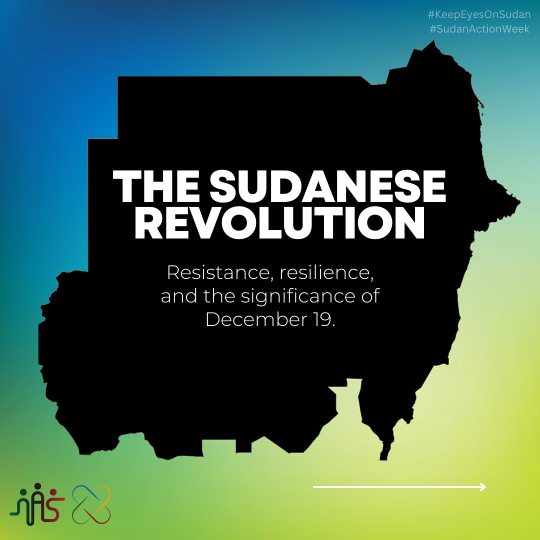
Via NasAlSudan
Learn about the Sudanese revolution, the significance of December 19, and a legacy of resistance and resilience.
Join our call to action today and everyday during Sudan Action Week.
December 19 2023
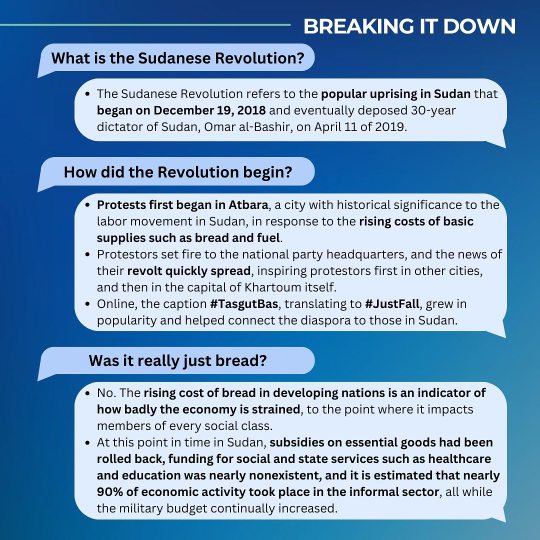
Transcript:
Breaking it down
What is the Sudanese Revolution?
The Sudanese Revolution refers to the popular uprising in Sudan that began on December 19, 2018 and eventually deposed 30-year dictator of Sudan, Omar al-Bashir, on April 11 of 2019.
How did the Revolution begin?
Protests first began in Atbara, a city with historical significance to the labor movement in Sudan, in response to the rising costs of basic supplies such as bread and fuel.
Protestors set fire to the national party headquarters, and the news of their revolt quickly spread, inspiring protestors first in other cities, and then in the capital of Khartoum itself.
Online, the caption #TasgutBas, translating to #JustFall, grew in popularity and helped connect the diaspora to those in Sudan.
Was it really just bread?
No. The rising cost of bread in developing nations is an indicator of how badly the economy is strained, to the point where it impacts members of every social class.
At this point in time in Sudan, subsidies on essential goods had been rolled back, funding for social and state services such as healthcare and education was nearly nonexistent, and it is estimated that nearly 90% of economic activity took place in the informal sector, all while the military budget continually increased.
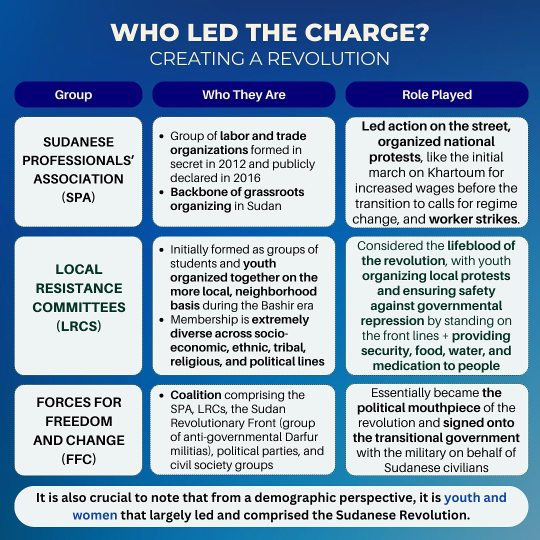
Transcript:
Who led the charge? Creating a revolution
Group: Sudanese Professional's association (SPA)
Who they are:
Group of labor and trade organizations formed in secret in 2012 and publicly declared in 2016
Backbone of grassroots organizing in Sudan
Role played:
Led action on the street, organized national protests, like the initial march on Khartoum for increased wages before the transition to calls for regime change, and worker strikes.
Group: Local Resistance Committees (LRCS)
Who they are:
Initially formed as groups of students and youth organized together on the more local, neighbourhood basis during the Bashir era
Membership is extremely diverse across socio-economic, ethnic, tribal, religious, and political lines
Role played:
Considered the lifeblood of the revolution, with youth organizing local protests and ensuring safety against governmental repression by standing on the front lines + providing security, food, water, and medication to people
Group: Forces for freedom and change (FFC)
Who they are:
Coalition comprising the SPA, LRCS, the Sudan Revolutionary Front (group of anti-governmental Darfur militias), political parties, and civil society groups
Role played:
Essentially became the political mouthpiece of the revolution and signed onto the transitional government with the military on behalf of Sudanese civilians
It is also crucial to note that from a demographic perspective, it is youth and women that largely led and comprised the Sudanese Revolution.
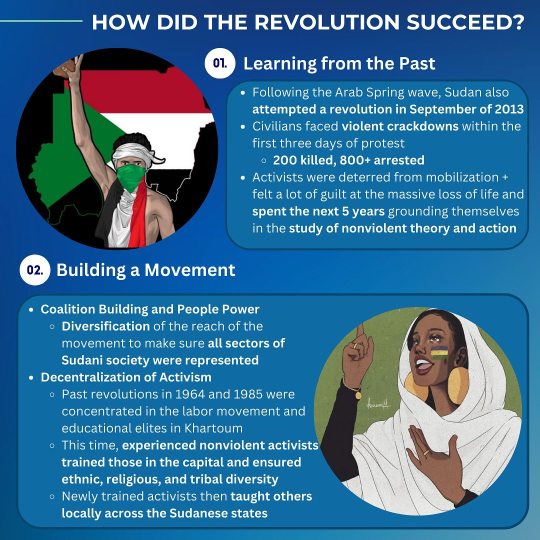
Trabscript:
How did the revolution succeed?
01. Learning from the Past
Following the Arab Spring wave, Sudan also attempted a revolution in September of 2013
Civilians faced violent crackdowns within the first three days of protest. 200 killed, 800+ arrested
Activists were deterred from mobilization + felt a lot of guilt at the massive loss of life and spent the next 5 years grounding themselves in the study of nonviolent theory and action
02. Building a Movement
Coalition Building and People Power
Diversification of the reach of the movement to make sure all sectors of Sudani society were represented
Decentralization of Activism
Past revolutions in 1964 and 1985 were concentrated in the labor movement and educational elites in Khartoum
This time, experienced nonviolent activists trained those in the capital and ensured ethnic, religious, and tribal diversity
Newly trained activists then taught others locally across the Sudanese states
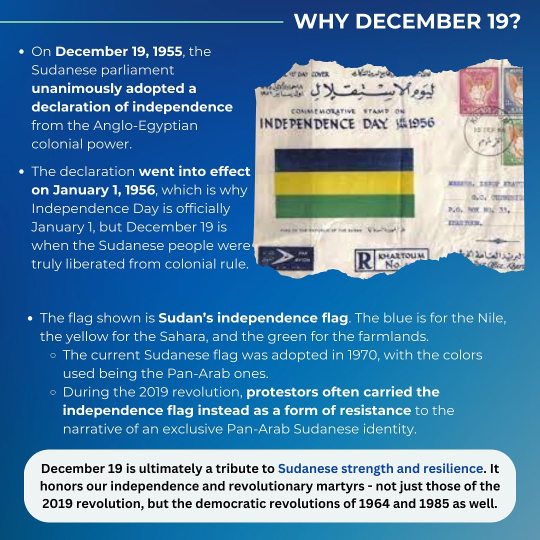
Transcript:
Why december 19?
On December 19, 1955, the Sudanese parliament unanimously adopted a declaration of independence from the Anglo-Egyptian colonial power.
The declaration went into effect on January 1, 1956, which is why Independence Day is officially January 1, but December 19 is when the Sudanese people were truly liberated from colonial rule.
The flag shown is Sudan's independence flag. The blue is for the Nile, the yellow for the Sahara, and the green for the farmlands.
The current Sudanese flag was adopted in 1970, with the colors used being the Pan-Arab ones.
During the 2019 revolution, protestors often carried the independence flag instead as a form of resistance to the narrative of an exclusive Pan-Arab Sudanese identity.
December 19 is ultimately a tribute to Sudanese strength and resilience. It honors our independence and revolutionary martyrs - not just those of the 2019 revolution, but the democratic revolutions of 1964 and 1985 as well.
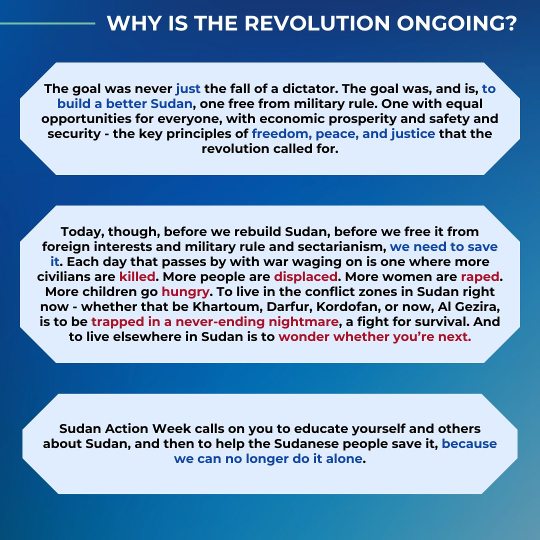
Transcript:
Why is the revolution ongoing?
The goal was never just the fall of a dictator. The goal was, and is, to build a better Sudan, one free from military rule. One with equal opportunities for everyone, with economic prosperity and safety and security - the key principles of freedom, peace, and justice that the revolution called for.
Today, though, before we rebuild Sudan, before we free it from foreign interests and military rule and sectarianism, we need to save it. Each day that passes by with war waging on is one where more civilians are killed. More people are displaced. More women are raped. More children go hungry. To live in the conflict zones in Sudan right now - whether that be Khartoum, Darfur, Kordofan, or now, Al Gezira, is to be trapped in a never-ending nightmare, a fight for survival. And to live elsewhere in Sudan is to wonder whether you're next.
Sudan Action Week calls on you to educate yourself and others about Sudan, and then to help the Sudanese people save it, because we can no longer do it alone.
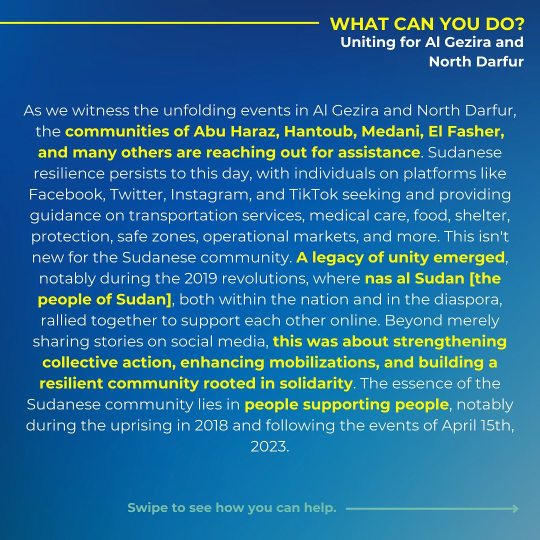
Transcript:
What can you do? Uniting for Al Gezira and North Darfur
As we witness the unfolding events in Al Gezira and North Darfur, the communities of Abu Haraz, Hantoub, Medani, El Fasher, and many others are reaching out for assistance. Sudanese resilience persists to this day, with individuals on platforms like Facebook, Twitter, Instagram, and TikTok seeking and providing guidance on transportation services, medical care, food, shelter, protection, safe zones, operational markets, and more. This isn't new for the Sudanese community. A legacy of unity emerged, notably during the 2019 revolutions, where nas al Sudan [the people of Sudan], both within the nation and in the diaspora, rallied together to support each other online. Beyond merely sharing stories on social media, this was about strengthening collective action, enhancing mobilizations, and building a resilient community rooted in solidarity. The essence of the Sudanese community lies in people supporting people, notably during the uprising in 2018 and following the events of April 15th, 2023
Swipe to see how you can help.
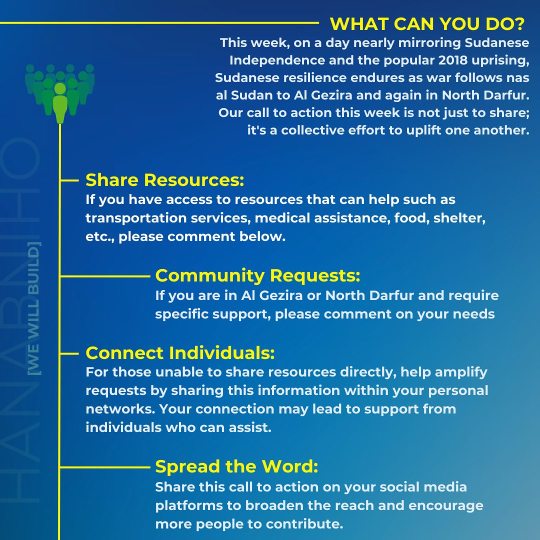
Transcript:
What can you do?
This week, on a day nearly mirroring Sudanese Independence and the popular 2018 uprising, Sudanese resilience endures as war follows nas al Sudan to Al Gezira and again in North Darfur. Our call to action this week is not just to share; it's a collective effort to uplift one another.
Share Resources:
If you have access to resources that can help such as transportation services, medical assistance, food, shelter, etc., please comment below.
Community Requests:
If you are in Al Gezira or North Darfur and require specific support, please comment on your needs
Connect Individuals:
For those unable to share resources directly, help amplify requests by sharing this information within your personal networks. Your connection may lead to support from individuals who can assist.
Spread the Word:
Share this call to action on your social media platforms to broaden the reach and encourage more people to contribute.
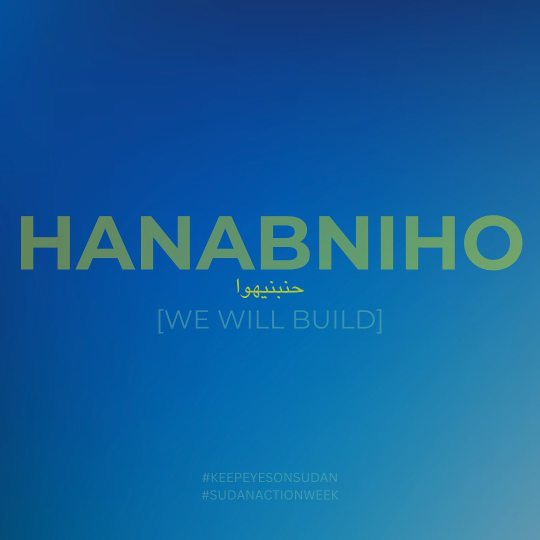
Transcript:
Hanabniho
حنبنيهوا
[We will rebuild]
#keepEyesOnSudan
#SudanActionWeek
925 notes
·
View notes
Text
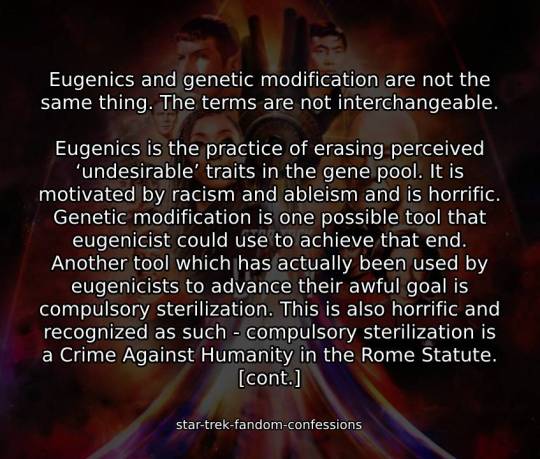
#1145
Eugenics and genetic modification are not the same thing. The terms are not interchangeable. Eugenics is the practice of erasing perceived ‘undesirable’ traits in the gene pool. It is motivated by racism and ableism and is horrific. Genetic modification is one possible tool that eugenicist could use to achieve that end. Another tool which has actually been used by eugenicists to advance their awful goal is compulsory sterilization. This is also horrific and recognized as such - compulsory sterilization is a Crime Against Humanity in the Rome Statute. However, sterilization procedures such as tube tying and vasectomies are not practices that people generally call for to be banned, because people may want to prevent themselves from getting pregnant or from getting another person pregnant for all sorts of reasons and we recognized that people should have autonomy over their own bodies and be free to make their own reproductive choices. Consensual vasectomies and tube tying being legal in a country does not mean that country is endorsing eugenics. A country in which there is a government program of coercing or using incentives to get members groups perceived as undesirable to have their tubes tied or have vasectomies is practicing eugenics. The legality and use of tool in general does not necessarily mean that the tool is being used for eugenics. Now, let’s take that one step further with a hypothetical on genetic engineering. Imagine that we determine that if one gene was removed from the human genome, those without that gene would no longer get dementia and there were zero other impacts. Would a country that made that genetic modification procedure available for free to everyone who wanted it and the doctors performing that procedure be practicing eugenics? Now imagine that procedure didn’t work in adults or even children. It had to be administered during fetal development to be effective. Would a parent choosing to have that gene removed from their unborn child so they would never get dementia be practicing eugenics? I'm not going to weigh in on those my point is that it’s a complex issue, there are very flew easy answers available and you really have to consider motive. Eugenicists are motivated by the view that certain people are superior and other people are inferior and they want to get rid of the latter.
Applying it to Strange New Worlds, Una has specifically stated that the Illyrian motivation for genetic modification is so that they fit in with their environment, rather than terraform (this intersects another really interesting scientific ethical discussion happening around climate engineering and the potential consequences). There is no evidence in canon that Illyrians are motivated by the need to be superior or are getting rid of undesired traits. They took up modification to live on planets that would otherwise be unhospitable to them (beta canon is that their home world is no longer inhabitable even with modification due to environmental collapse outside of their control, they’re essentially environmental refugees). While Illyrians modify themselves genetically, there is no evidence that Illyrians are practicing eugenics. In the context of DS9, Bashir’s parents believed it was undesirable to have a son with intellectual disabilities. They modified him to get rid the trait they perceived as undesirable. They were practicing eugenics. In Star Trek canon, billions of people died during the Eugenics Wars. When it comes to the law, it is incredibly difficult determining motive and therefore it is understandable that they banned genetic engineering as a way of stopping eugenicists and preventing a repeat. But in doing so, they accidentally created a legal regime in which entire families could be arrested. The point Star Trek has been making lately with the Illyrian storyline is sometimes shit is complicated, and that a law that is meant to protect, can also sometimes harm and we need to be able to listen, think and consider complex situations. And I also hate myself a bit for writing this. I should just be able to ignore all the terrible takes and ‘I haven’t watched but…’ people.
#confession 1145#two parts confession#star-trek-fandom-confessions#star trek#strange new worlds#critical confession#episode tag: Ad Astra Per Aspera#Illyrians#augments#eugenics#episode tag: Doctor Bashir I Presume#deep space nine
72 notes
·
View notes
Text
Let's talk about Sudan-
TRANSCRIPT UNDER CUT

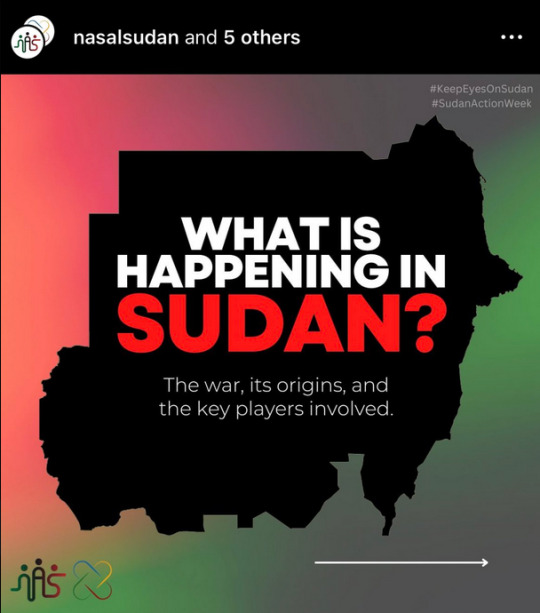
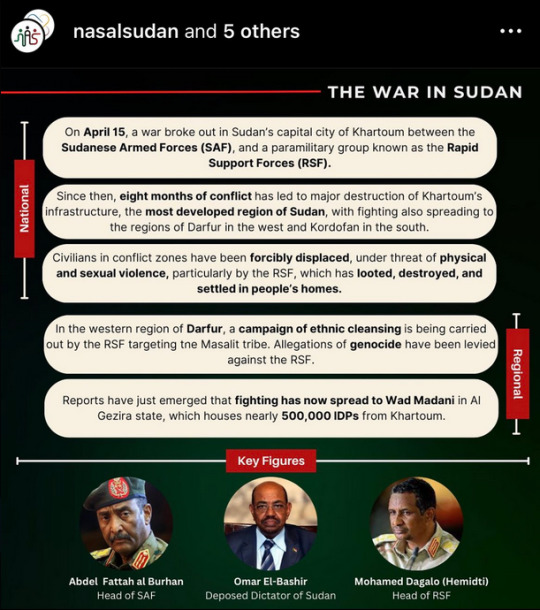
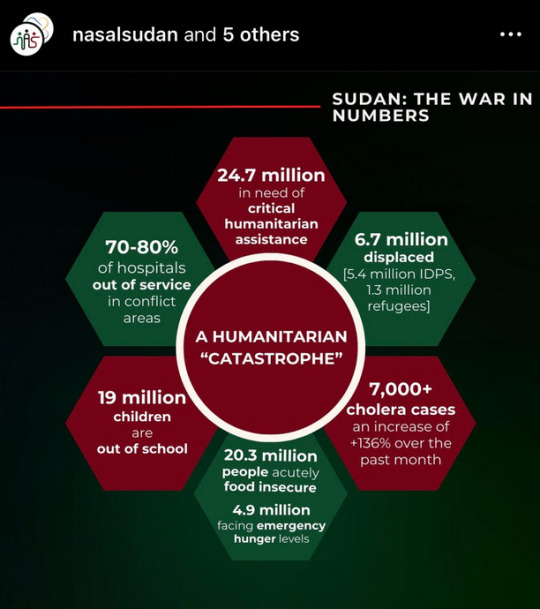

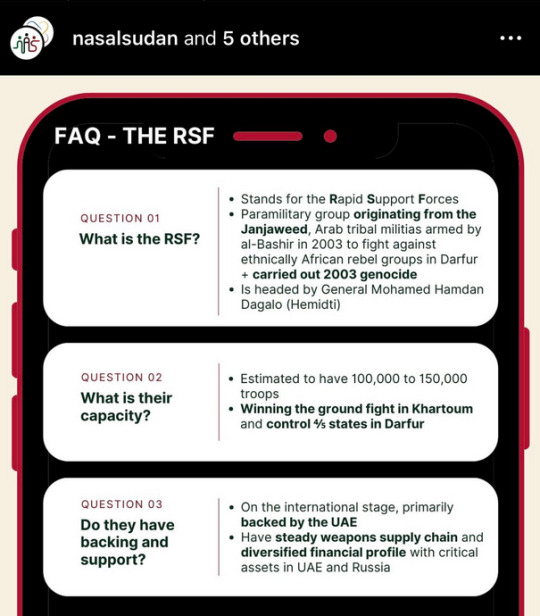
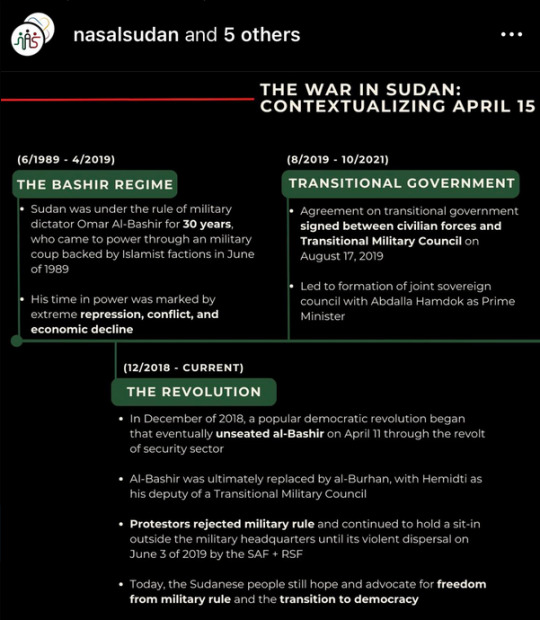
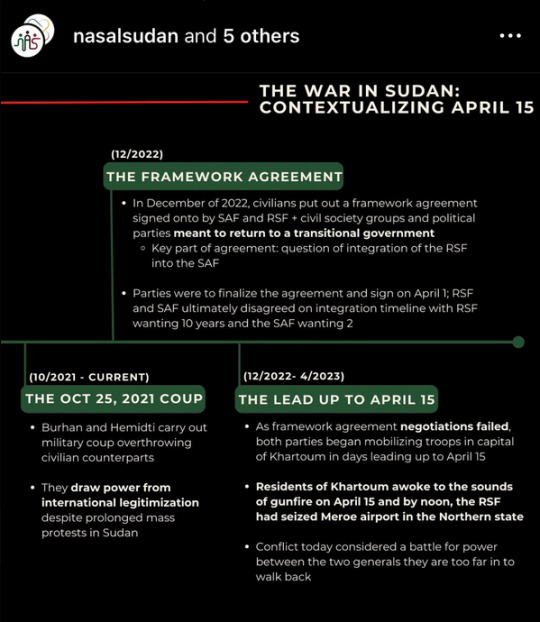
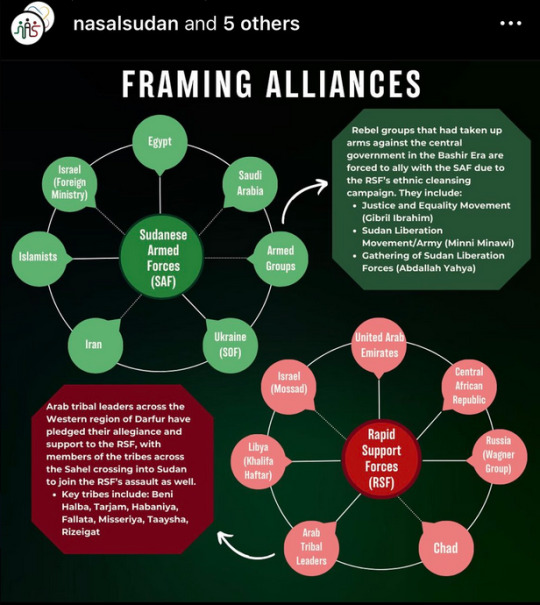
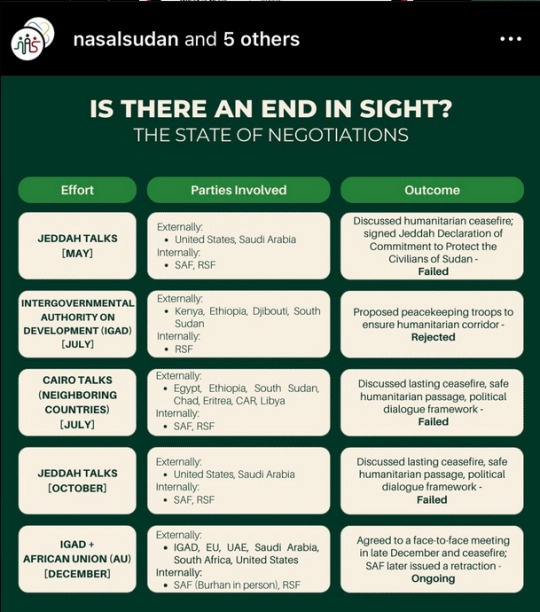
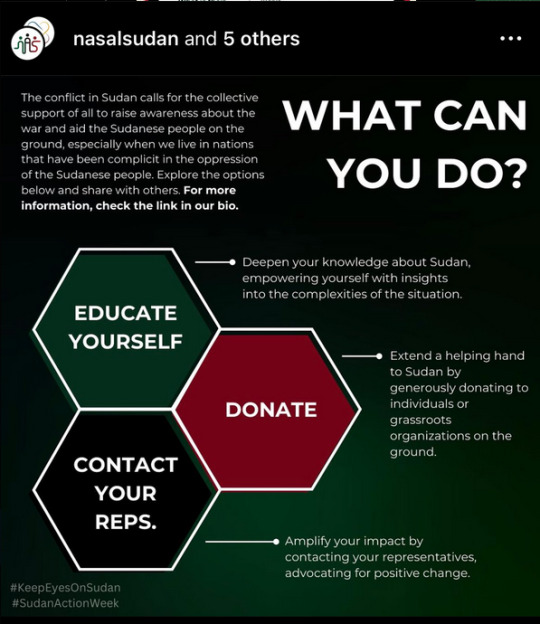
Transcript: What is happening in Sudan? The war, its origins, and the key players involved.
The war in Sudan
On April 15, a war broke out in Sudan's capital city of Khartoum between the Sudanese Armed Forces (SAF), and a paramilitary group known as the Rapid Support Forces (RSF). Since then, eight months of conflict has led to major destruction of Khartoum's infrastructure, the most developed region of Sudan, with fighting also spreading to the regions of Darfur in the west and Kordofan in the south.
Civilians in conflict zones have been forcibly displaced, under threat of physical and sexual violence, particulary by the RSF, which has looted, destroyed, and settled in people's homes.
In the western region of Darfur, a campaign of ethnic cleansing is being carried out by the RSF targeting the Masalit tribe. Allegations of genocide have been levied against the RSF.
Reports have just emerged that fighting has now spread to Wad Madani in AI Gazira state, which houses nearly 500,00 IDPs from Khartoum.
Key Figures: Abdel Fattah al Burhan (head of SAF), Omar El-Bashir (deposed dictator of Sudan), Mohamed Dagalo (Hemidti) (head of RSF)
Sudan: the war in numbers
24.7 million in need of critical humanitarian assistance 6.7 million displaced [5.4 million IDPS, 1.3 million refugees] 7,000+ cholera cases an increase of +136% over the past month 20.3 million people acutely food insecure- 4.9 million facing emergency hunger levels 19 million children are out of school 70-80% of hospitals out of service in conflict areas
FAQ - THE SAF
What is the SAF?
stands fro the Sudanese Armed Forces
is the de-facto government of Sudan
is headed by Lt. General Abdel Fattah al-Burhan
What is their capacity?
estimated to have aprox. 200,000 personnel and tactical advantage of airforce
currently control of relative northern and eastern regions of Sudan with functioning capital in Port Sudan (East)
Do they have backing and support?
on the international stage, primarily backed by Egypt
limited weapons supply from allies
internally, the SAF is ultimately considered the lesser of two evils
FAQ - THE RSF
What is the RSF?
stands fro Rapid Support Forces
paramilitary group originating from the Janjaweed, Arab tribal militias armed by al-Bashir in 2003 to fight against ethnically African rebel groups in Darfur + carried out 2003 genocide
is headed by General Mohamed Hamdan Dagalo (Hemidti)
What is their capacity?
estimated to have 100,000 to 150,000 troops
winning the ground fight in Khartoum and control 4/5 states in Darfur
Do they have backing and support?
on the international stage, primarily backed by the UAE
have steady weapons supply chain and diversified financial profile with critical assets in UAE and Russia
The war in Sudan: contextualizing April 15
6/1989 - 4/2019 - The Bashir Regime Sudan was under the rule of military dictator Omar Al-Bashir for 30 years, who came to power through an military coup backed by Islamist factions in June of 1989 His time in power was marked by extreme repression, conflict, and economic decline
12/2018 - current - The revolution In December of 2018, a popular democratic revolution began taht eventually unseated al-Bashir on April 11 through the revolt of security sector Al-Bashir was ultimately replaced by al-Burhan, with Hemidti as his deputy of a Transitional Military Council Protestors rejected military rule and continued to hold a sit-in outside the military headquarters until its violent dispersal on June 3 of 2019 by the SAF + RSF Today, the Sudanese people still hope and advocate for freedom from the military rule and the transition to democracy
8/2019 - 10/2021 - Transitional Government Agreement on transitional government signed between civilian forces and Transitional Military Council on August 17, 2019 Led to formation to joint sovereign council with Abdalla Hamdok as Prime Minister
10/2021 - Current - The Oct 25, 2021 Coup Burhan and Hemidti carry out military coup overthrowing civilian counterparts They draw power from international legitimization despite prolonged mass protests in Sudan
12/2022- The Framework Agreement In December of 2022, civilians put out a framework agreement signed onto by SAF and RSF + civil society groups and political parties meant to return to a transitional government - key part of agreement: question of integration of the RSF into the SAF Parties were to finalize the agreement and sign on April 1; RSF and SAF ultimately disagreed on the integration timeline with RSF wanting 10 years and the SAF wanting 2
12/2022-4/2023 - The Lead up to April 15 As framework agreement negotiations failed, both parties began mobilizing troops in capital of Khartoum in days leading up to April 15 Residents of Khartoum awoke to the sounds of gunfire on April 15 and by noon, the RSF had seized Meroe airport in the Northern state Conflict today considered a battle of power between the two generals they are too far in to walk back
Framing alliances
Sudnese Armed Forces (SAF):
Saudi Arabia
armed groups- rebel groups that had taken up arms against the central government in the Bashir Era are forced to ally with the SAF due to the RSF's ethnic cleansing campaign. They include: Justice and Equality Movement (Gibril Ibrahim), Sudan Liberation Movement/Army (Minni Minawi), Gathering of Sudan Liberation Forces (Abdallah Yahya)
Ukraine (SOF)
Iran
Islamists
Israel (Foreign Ministry)
Egypt
Rapid Support Forces (RSF):
United Arab Emirates
Central African Republic
Russia (Wagner Group)
Chad
Arab Tribal Leaders- Arab tribal leaders across the Western region of Darfur have pledged their allegiance and support to the RSF, with members of the tribes across the Sahel crossing into Sudan to join the RSF's assault as well. Key tribes include: Beni Halba, Tarjam, Habaniya, Fallata, Misseriya, Taaysha, Rizeigat
Libya (Khalifa Haftar)
Israel (Mossad)
Is there an end in sight? The state of negotiations
Effort- Jeddah Talks [May] Parties Involved- Externally: United States, Saudi Arabia. Internally: SAF, RSF Outcome: discussed humanitarian ceasefire; signed Jeddah Declaration of Commitment to Protect the Civilians of Sudan- FAILED
Effort- Intergovernmental authority on development (IGAD) [July] Parties Involved- Externally: Kenya, Ethiopia, Djibouti, South Sudan . Internally: RSF Outcome: proposed peacekeeping troops to ensure humanitarian corridor-REJECTED
Effort- Cairo talks (neighboring countries) [July] Parties Involved- Externally: Egypt, Ethiopia, South Sudan, Chad, Eritrea, CAR, Libya. Internally: SAF, RSF Outcome: discussed lasting ceasefire, safe humanitarian passage, political dialogue framework-FAILED
Effort- Jeddah talks [October] Parties Involved- Externally: United States, Saudi Arabia . Internally: SAF, RSF Outcome: discussed lasting ceasefire, safe humanitarian passage, political dialogue framework-FAILED
Effort- IGAD + African Union (AU) [December] Parties Involved- Externally: IGAD, EU, UAE, Saudi Arabia, South Africa, United States. Internally: SAF (Burhan in person), RSF Outcome: agreed to face-to-face meeting in late December and ceasefire; SAF later issued a retraction-ONGOING
What can you do?
The conflict in Sudan calls for the collective support of all to raise awareness about war and aid the Sudanese people on the ground, especially when we live in nations that have been complicit in the oppression of the Sudanese people. Explore the potions below and share with others. Educate yourself- deepen your knowledge about Sudan, empowering yourself with insights into the complexities of the situation. Donate- extend a helping hand to Sudan by generously donation to individuals or grassroots organizations on the ground.
Contact your reps- amplify your impact by contacting your representatives, avocating for positive change
226 notes
·
View notes
Text
I've said before and I'll keep saying it: Palestine exposed Western liberals and Syria exposed Western leftists.
Their unchecked racism and ideological blind spots are just as nasty as liberals..

You can easily figure out how much these Leftist Western experts on Syria don't actually know a goddamn damn thing about Syria when you ask them a simple question.
Don't ask them if they can understand Arabic, or if they have ever spoken to actual Syrians who lived through Assad's brutal regime, and how long ago they figured out where Syria is located on the map.
Don't ask why the vast majority of Palestinians are staunch supporters of the Syrian revolution. Don't ask them why Hamas has always supported Syrian rebels.

No.
Just ask them about the Assad family's very long and loving relationship with America.
Just ask them about the Assad Family's very friendly and servile relationship with Israel from the late 60's onwards. Ask them why Syria was such a good neighbor to Israel all these many decades.
Then ask them how exactly Bashir differed from his family regarding his policy towards Israel, enough for Israel to waste resources on toppling him. Bashir is still every bit an Assadist royal as his father before him.
Temporarily allying himself with Hezbollah to save his own ass (because he could no longer trust America to not replace him with another Assadist royal), doesn't fucking mean he has suddenly become anti-Israel or anti-American imperialism.
This is an utterly deranged, completely laughable "analysis" that can't be uttered by anyone familiar with the history of the Assad royal family and its loving relationship with America and Israel.
Asssad is not and has never been against America, but his main concern - after the Arab Spring - is keeping himself in power, and if that necessitated Russian and Iranian propaganda portray him as a revolutionary leader fighting against American imperialism, he'd gladly take it.
You might be ignorant enough or dumb enough to believe Russian and Iranian propaganda, but America isn't.
America knows Assad is a cowardly rat who would crawl back - after crushing the rebellion - to the biggest superpower that can secure his power. That's America and Israel.
This is why America and Israel never bothered to topple Assad the same way they toppled their other puppets in the Middle East. That is why they've only sent their terrorist mercenaries to fight off Hezbollah and Syrian rebels but never targeted Assad's forces. I was there in 2011. I saw countless videos of these US-backed terrorists fighting and slaughtering the Syrian rebels while not harming a single fucking Assad-backed fighter.
They want Assad weakened enough to crawl back to them and only rely on them for protection, but they don't want his regime or his royal family gone. They're their biggest fucking allies in the Middle East, for fuck's sake! They might get rid of Assad in the future if he proved to be too concerned with his own survival (like Gaddafi did), but they won't ever get rid of the Assad Family.
32 notes
·
View notes
Text
FATIMA AHMED IBRAHIM // ACTIVIST
“She was a Sudanese writer, women's rights activist and socialist leader. She came from an educated family, with her father being expelled from teaching in a government school when he refused to teach lessons using English during the Anglo-Egyptian colonial period in Sudan. She created a wall newspaper in Omdurman Girls’ Secondary School, even conducting the first women's strike in Sudan because her school administration decided to cancel science lessons and replaced them by 'family science' lessons. The strike was successful. Her activities went beyond school; in 1947 she founded the Intellectual Women's Association, and in 1952 she worked with other women and founded the Sudanese Women's Union. In 1955 Fatima became a chief editor of Sawat al-Maraa Magazine or Woman's Voice Magazine (published by the Women's Union), and this magazine later played an essential role in the overthrow of the Ibrahim Abboud regime. In 1954, Fatima joined the Sudanese Communist Party (SCP), and for a short period Fatima became a member of the Central Committee of the SCP (the SCP was the first Sudanese Party which had an internal women's structure, since 1946). In 1956–57, Fatima became the president of the Women's Union. In 1965 Fatima was elected to parliament, becoming the first Sudanese women deputy. In 1967, Ibrahim was one of four women to be elected to the 33 member Central Committee of the Sudanese Communist Party. In 1971, she was put on house arrest after her husband attempted a military coup against Jaafar Muhammad al-Nemieri. She was also arrested several times during his regime. In 1990, she left Sudan after the Omar Hassan al-Bashir military coup, and joined the opposition in exile as the President of the banned Sudanese Women's Union. In 1991, Fatima was elected President of the Women's International Democratic Federation. She returned to Sudan in 2005 after a reconciliation between the government and opposition, and was appointed as a deputy in the parliament representing the SCP.”

12 notes
·
View notes
Text
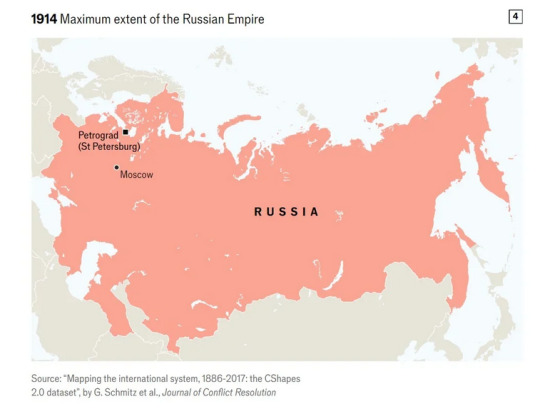
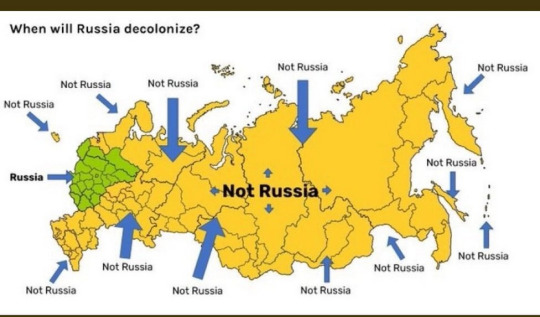
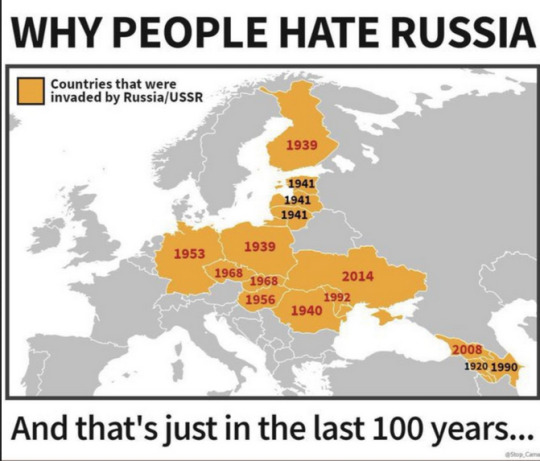

Project2025 #TechBros #CorpMedia #Oligarchs #MegaBanks vs #Union #Occupy #NoDAPL #BLM #SDF #DACA #MeToo #Humanity #FeelTheBern
JinJiyanAzadi #BijiRojava Putin Sure Does Love Old Maps, Sort Of
The Economist publishes seven maps exposing Putin's distorted historical claims
Russian dictator Vladimir Putin has attempted to justify his full-scale invasion of Ukraine with pseudo-historical claims, asserting that Russians and Ukrainians are one people supposedly divided by "external forces," according to an "anti-Russian" plan…
20190121 The Sudan uprising: “This is a people’s revolution”
20211213 EU imposes restrictive measures against the Wagner Group
20220215 War and Anarchists: Anti-Authoritarian Perspectives in Ukraine
20220223 Vladimir Putin’s Revisionist History of Russia and Ukraine
20220302 Ukraine • While Waiting for the Bomb |2
20220311 Male State: The Russian Online Hate Group Backing Putin’s War
20220314 The Invasion of Ukraine: Anarchist Interventions and Geopolitical Changes
20220325 Putin’s Private Army, the Wagner Group Out to Assassinate Zelensky, Faces Sanctions
FURTHER READING:
10 notes
·
View notes
Text
It’s only a matter of time before the supporters of Assad are rounded up and “prosecuted”.
Here’s a few headlines, the first describes events so far.
Syria – live: Israel fires more than 350 strikes against Syria as Mohammed al-Bashir appointed temporary PM
Here’s a report of US strikes:
Shockwaves in Syria – U.S. Targets Extremists After Regime Topples | RightWing
And another from a UK tabloid about the looting of the presidential palace, Iranian, Italian and Iraqi embassies and the central bank.
Syrian rebels loot banks, ransack Assad's millions & storm embassies after toppling tyrant as nation descends into chaos | The Sun
Lots of embedded videos and pictures in those articles.
Israel is going to establish a “sterile zone” beyond the Golan Heights whilst the US is poised to recognise the rebel leader, as he says that elections will be held by March 2025.
There is no mention of UK and EU military involvement.
No doubt tens of billions of dollars are on the way from NATO countries – starting with humanitarian aid to the areas that have been blown to bits.
There are estimates of a million displaced Syrians out of the country’s 22 million or so remaining people.
There is also no news of any Russian, Iranian, Iraqi or Turkish military operations. Neither is there any news about the activity of Kurds seeking to establish an autonomous region in the north of Syria.
Right now, the Israeli and US forces are acting with impunity and with no consequences for their actions.
I doubt this is the end of the conflict or its repercussions.
7 notes
·
View notes
Text
One of the oldest and largest Christian communities in the Middle East faces renewed threats in a cycle of violence that has forced millions of Christians to flee the region over the past half-century.
Although most of the thousand or so people reported killed in recent violence on the Syrian coast were Alawites — members of a Syrian religious minority which follows a branch of Shia'a Islam — rights groups say that Christians were also among those killed in a crackdown by the Sunni Muslim-led factions of Syria's new government.
"We are entering a dangerous new phase," Deputy Leader of the Assyrian Democratic Organization (ADO) Bashir al-Saadi, a Christian, told Newsweek. He warned of an escalating push toward hardline Islamic rule with crackdowns on alcohol sales and gender mixing.
"There is a fear of identity-based killings, not only for Christians but for other religious minorities as well... Christians face constant provocation, and there is a widespread sense of insecurity," he said.
Syria's leading churches — including the Greek Orthodox, Syriac Orthodox, and Melkite Greek Catholic communities — have expressed concern over the recent violence. While Christians were not the primary target, they remain vulnerable, with reports of extremists broadcasting jihadist messages in Christian neighborhoods and burning Christmas trees.
Newsweek has reached out to the Syrian government for comment.
Where Are Christians in the Middle East?
According to 2024 data from the International Christian Concern (ICC), an advocacy organization raising awareness about the persecution of Christians worldwide, the Christian populations of both Iraq and Syria have dwindled by approximately 75 to 85 percent over the past two decades, while the Palestinian Christian community is increasingly under threat, with Gaza's Christians facing near disappearance in the conflict between Israel and Hamas.
Islamists Consolidate Power
Rights groups, such as the Syrian Observatory for Human Rights (SOHR), have reported that recent killings on the coast were carried out by forces linked to the Syrian government as they cracked down on supporters of ousted President Bashar al-Assad, who was toppled in December 2024.
Syria is now led by interim President Ahmad al-Sharaa of the Sunni Muslim Haya'at Tahrir al-Sham (HTS) rebel group, formerly the Al-Nusra Front, and proscribed as a terrorist group in the West.
Early on, he met with church leaders in a show of tolerance towards other religions. HTS also condemned the burning of a Christmas tree in Hama, central Syria. In a New Year's greeting message, Al-Shara'a said Christians are "an essential part of the fabric of Syrian society. The bond between the Syrian people, with its various components, reflects the strength of our unity and diversity," media reported.
But many Christians are worried at what they see as increasing Islamist influence. Father Rami Elias, a Syrian Orthodox Priest said al-Sharaa spoke of implementing a civil legislative governance but expressed uncertainty. "It is ambiguous — we cannot discern his true intentions," he was quoted as saying by the Catholic News Agency in January.
Syria's new leadership
While al-Sharaa's government established a fact-finding committee to investigate the recent violence, few arrests have been made.
Religious minorities also fear a constitutional declaration could usher in a new form of dictatorship without either meaningful political reforms or protections for minorities.
Al-Saadi, who accepted an invitation to join Syria's national dialogue in February, called it a "token participation." A political opponent of the former regime and a participant in the 2011 anti-Assad protests, he said that while past Syrian constitutions declared Islamic Sharia as the basis of law, the Assad family never enforced it, and religious freedom was greater during that time.
What People Are Saying
Deputy Official of the Assyrian Democratic Organization (ADO) Bashir al-Saadi told Newsweek: "There is a fear of identity-based killings, not only for Christians but for other religious minorities as well, because al-Sharaa dismisses their rights. The rhetoric of declaring others infidels, marginalization, and violence continues. No Syrian Christians have returned to the country since Assad's fall. Christians face constant provocation, and there is a widespread sense of insecurity."
Amnesty International: "The horrific images emerging from Syria's coast, with bodies lying in the streets and grieving families mourning their loved ones, are a grim reminder of the past cycles of atrocities Syrians have endured and risk inflaming sectarian tensions and fueling further deadly violence."
Mina Thabet, human rights defender and expert on minority issues told Newsweek: "As extremist Islamic groups continue to rise, the Christian exodus, which has accelerated since the Arab Spring, intensifies. The lack of democratic governance, political and civic spaces across much of the Middle East further endangers Christian communities who already struggle to find spaces that can voice their concerns. The absence of free and open political and civic spaces risks most efforts to combat extremist ideologies, limiting interventions to pure security approaches which in most cases fail to address root causes of the issues."
What Happens Next
The growing tensions and Islamist ascendancy in Syria raise the potential for increased departures of Christians from the country, as seen in other parts of the Middle East such as Egypt, Iraq, Lebanon and Palestinian territories.
9 notes
·
View notes
Text
“If you were Masalit, we decided that we don’t want to leave any alive, not even the children.” This explicit warning, recounted by a survivor to Human Rights Watch, by a militiaman of the Rapid Support Forces (RSF) and its allies last June is emblematic of the ongoing genocidal atrocities in Darfur. Rarely does the world bear witness to such open confessions of genocidal intent.
The RSF is the successor to the janjaweed militia, which carried out a genocide in Darfur just 20 years ago against non-Arab ethnic groups such as the Fur, Masalit, and Zaghawa. At the time, a mass movement emerged in the United States—led by the Save Darfur coalition, which comprised nearly 200 organizations—mobilizing worldwide protests and bringing out prominent celebrities, including then-Sen. Barack Obama and George Clooney, and demonstrators in the hundreds of thousands.
A powerful U.N. Security Council arms embargo, sanctions regime, and referral to the International Criminal Court ensued, resulting in the first—and only—arrest warrant for genocide against Sudanese leader Omar al-Bashir, while an eventual joint U.N.-African Union peacekeeping force was dispatched to the region; it was later withdrawn in 2021.
This time, the world is nowhere to be found. The U.N. Security Council has passed only a single resolution after nearly a year into the conflict, merely calling for a temporary cessation of hostilities during the month of Ramadan—a step that should have been taken on day one.
Many RSF commanders today are former janjaweed leaders themselves, including the head of the RSF, Mohamed Hamdan “Hemeti” Dagalo. The RSF largely recruits on an ethnic basis from Arab communities, whose militiamen have continued to perpetrate systematic massacres and sexual violence against non-Arab communities on the basis of their ethnicity.
The current genocide unfolding in Darfur is crowded out by coverage of Gaza, Ukraine, and the broader war in Sudan, portrayed as an internal armed conflict between the Sudanese Armed Forces (SAF) and the RSF. But the ethnically targeted violence in Darfur must be distinguished from this broader conflict, demanding an immediate response in the form of civilian protection.
This is all happening in the context of a shamefully overlooked humanitarian catastrophe. The estimated death toll currently is as many as 150,000; nearly 9 million Sudanese have been forcibly displaced; and 25 million people—half of Sudan’s population—are in need of humanitarian aid. In the worst scenarios, 2.5 million people are projected to die by famine, while 18 million face acute food insecurity, and nearly 4 million children are acutely malnourished. It is a man-made disaster of inconceivable proportions.
In recent weeks, the RSF has razed dozens of communities to the ground at a shocking pace around El Fasher, the capital of North Darfur. The city’s population of up to 2.8 million, including 750,000 children, is already on the brink of famine with nowhere to go. The long-feared attack on El Fasher is now well underway, and the window to intervene to protect civilians is closing.
The legal community is already coalescing around a consensus that the RSF campaign in West Darfur constitutes genocide. As human rights lawyers specializing in atrocity prevention, we chaired the first international inquiry into the genocide with dozens of jurists and scholars around the world, concluding that the RSF is responsible for committing genocide in Darfur.
Our panel of experts included founding prosecutors of the international criminal tribunals and presidents of the International Association of Genocide Scholars. The United Nations Office on Genocide Prevention and the Responsibility to Protect echoed our independent finding, which is further corroborated by a substantial report by Human Rights Watch on the RSF’s ethnically targeted campaign of genocidal violence.
Our inquiry also concluded that the RSF is receiving direct military, financial, and diplomatic support from the United Arab Emirates. This finding is also backed by the U.N. Panel of Experts on Sudan, who found credible evidence of the UAE providing heavy weaponry to the RSF, as corroborated by further investigative reporting. In December 2023, a group of U.S. members of Congress sent a letter to the Emirati foreign minister urging an end to the UAE’s provision of military support to the RSF. This May, legislation was introduced to stop U.S. arms exports to the UAE until it ceases its support to the RSF.
The RSF’s offensive across Darfur mirrors the genocidal attacks of the early 2000s, only with more advanced weaponry. The RSF and its militias have methodically massacred and committed sexual violence against members of the Masalit community after interrogating and screening their victims’ ethnicity, singling out Masalit members to be raped or executed at close range. The RSF’s campaign should be described accurately and confronted as such. History is repeating itself as the world is turning away.
Major powers have not only failed to take decisive action on Sudan but continue to fail to even issue decisive statements, instead parroting old, empty platitudes for all parties to cease hostilities without even directly naming the genocidaires and their sponsors. This diplomatic posturing has not changed since the first weeks of the war in April 2023, despite mounting evidence of escalating genocide in Darfur—perpetrated by the RSF.
The international community is repeating the exact same fatal mistakes of the early 2000s by prioritizing a sham political process in Saudi Arabia, entirely removed from an ongoing genocide. Vague calls on all parties to negotiate is not only a pretense but a form of complicity when it serves as cover for the RSF, allowing its fighters to perpetrate the impending massacres against vulnerable civilians in El Fasher with impunity.
As the RSF besieges and attacks El Fasher, cutting off water and critical supplies, the world must prepare for the worst-case scenario. The SAF cannot be trusted to protect civilians, for it once created, trained, and equipped the RSF to commit atrocities against the non-Arab populations in Darfur. But even if the SAF were willing to protect them today, it is unable to protect its military bases, let alone civilians.
When the SAF abandoned its posts in West Darfur, the RSF went on a killing spree, systematically murdering men and boys and committing rape and other forms of sexual violence against women and girls based on their identity. On this empirical basis, we know how the same pattern will repeat itself in El Fasher.
The only way to halt the RSF’s impending genocide in El Fasher is by imposing immediate costs on the perpetrators. The continuing impunity sends a clear message that the international community will simply stand by.
Last month, the U.S. government rightfully urged the RSF to retreat from El Fasher or “face further consequences” and called out the “external backers of the belligerents [who] continue the flow of weapons into the country.”
If the U.S. government is to be true to its word, these consequences and external backers must now be specifically articulated. The United States has the most influence to exercise the leverage and pressure needed to immediately stem the violence. Washington has the power to stop this genocide but is failing to do so.
First, given the risk of imminent massacres in El Fasher, U.S. President Joe Biden should openly call on Hemeti to call off this attack—or simply phone Washington’s close ally Emirati President Sheikh Mohammed bin Zayed Al Nahyan to urge him to exert pressure on Hemeti to withdraw his forces from El Fasher. The United States should threaten Hemeti with immediate consequences for imminent crimes against humanity and genocide in El Fasher, including sanctions and arrest warrants to stamp the RSF leaders with pariah status internationally. This time, it should not be an empty threat; actions must follow.
Second, the United States should work with regional partners to build support for an AU-led civilian protection mechanism in El Fasher to facilitate humanitarian aid routes and safe passage. Whereas Chad was reachable by foot from El Geneina in West Darfur, civilians in El Fasher are trapped with nowhere to go.
Third, Biden should publicly call out the UAE for its support of the RSF. Unless the UAE ceases its support, the RSF will continue to commit atrocities targeting defenseless communities.
Fourth, the U.S. government should call an emergency open debate on El Fasher at the U.N. Security Council and pass a resolution for a cease-fire, civilian protection, and immediate consequences on all actors openly defying the arms embargo and fueling this genocide, including the UAE.
Fifth, the United States and all 152 other parties to the Genocide Convention should fulfill their obligations to prevent genocide by, at a minimum, imposing costs and sanctions on all of the RSF’s enablers, including all companies owned by or linked to the RSF, and all sponsors of this conflict more broadly.
Finally, the humanitarian aid pledges made by countries at the Paris conference for Sudan in April must be immediately implemented to prevent wide-scale famine, as the lean season sets in. Only 16 percent of the overall funding required for the bare minimum U.N. humanitarian response plan has been received so far. All humanitarian aid should be carefully distributed as much as possible to local organizations, including volunteer emergency response rooms doing the front-line work.
At present, there is scarcely any media coverage of Darfur. The same atrocities that sparked a mass movement just 20 years ago are being completely overlooked today. There is no reason why the same coalition should not come together once again today, in a landscape with greater potential to mobilize broader support through social media.
While we fear that the window to intervene for the people of Darfur is closing, we are writing this as an urgent appeal. Let no one say they did not know.
18 notes
·
View notes
Text
DS9 E2E18 - Profit and Loss
Star Trek is really good at both telling us who the bad guys are in a very black and white fashion but they're also very good at then taking that and throwing it into a blender to make things all sorts of shades of gray. I find myself feeling the shades of gray with the Cardassians. I rather loathe them, in the way that we're supposed to. They're literal space yahtzees, the show has stated that they've created war crimes similar to those of the Holocaust. It's valid to hate them. That said, they keep dropping stray Cardassians into the mix that aren't like the others. Quark's lost love being one of them.
Everytime a Cardassian comes aboard I'm waiting for the ultimate betrayal and while a betrayal did happen, I'm honestly glad it came from the clearly marked oppressor.
I appreciate how even the Cardassians would have freedom fighters that were around to try to help save Cardassia from fash rule. I was a little weirder out that she kept calling them her students, but only because it made it feel more cult like but that was just a side note my brain kept thinking throwing at me when she did lol
Quark's storyline in this was interesting. I'm not generally a fan of sudden romance stories but the idea that a Ferengi would give up everything for a woman is incredibly out of character (as a whole) it was fascinating to watch him go from "SHE gets free things, you have to pay" to "You're with her, you get free drinks but only drinks" to "I'll give you this VERY important device for free if you get her to stay" to "Take me with you, I'll abandon everything for you."
To be clear, I don't think that last part would have lasted, even if he stayed devoted and loyal, he'd still start to scheme or try to make a profit somewhere. The man doesn't even take his first breath in the morning before he starts to consider the money he can make, he's not giving it up completely. But even the idea of it was interesting.
And then he got Odo to release them? And Odo did? Shocking but awesome all the same.
Having an episode with Garak and no Bashir should be a crime but having a very flamboyant Garak in the episode at all is a win that I'll take.
I wasn't sure the angle they were trying to pull with him because, from my read on the character so far he was against the Cardassian regime or at least had grown to have a bad taste for it so when he "outed" them for being there I was super confused.
Even when he showed up at the end to kill them I was kinda surprised that he would do that. But when he ended up killing the actual villain of this specific episode instead it made me wonder if he was playing some kind of 4D chess. Still don't know where he stands (and I'm okay with it) or what his intentions were but I appreciate the outcome. Chaos Garak for the win.
A show note, not exactly an episode note (though it did happen here): I love how they use his tailor shop and analogies to describe things/situations/warn folks. This is the second time he's done this and its a fun narrative feature that I dig.
7/10 - the plot itself was all over the place and I have more questions than answers but this was a fun ride. Saved from a 6.5 because Garak, though.
#star trek#star trek ds9#ds9#watchalong#star trek deep space nine#ds9 quark#elim garak#profit and loss
17 notes
·
View notes
Text
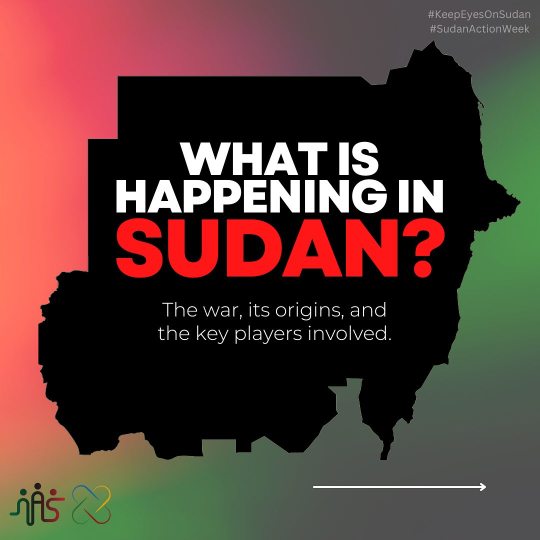
Via NasAlSudan
December 17 2023. #KeepEyesOnSudan #SudanActionWeek
Swipe through to build a foundational understanding of the war, its origins, and the key players involved. For actionable ways to support those in Sudan, check the link in our bio. Stay tuned for more posts this week.
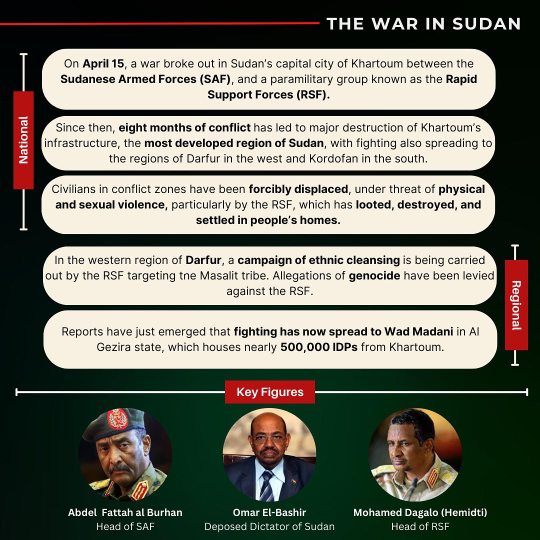
Transcript:
National:
On April 15, a war broke out in Sudan's capital city of Khartoum between the Sudanese Armed Forces (SAF), and a paramilitary group known as the Rapid Support Forces (RSF).
Since then, eight months of conflict has led to major destruction of Khartoum's infrastructure, the most developed region of Sudan, with fighting also spreading to the regions of Darfur in the west and Kordofan in the south.
Civilians in conflict zones have been forcibly displaced, under threat of physical and sexual violence, particularly by the RSF, which has looted, destroyed, and settled in people's homes.
Regional:
In the western region of Darfur, a campaign of ethnic cleansing is being carried out by the RSF targeting the Masalit tribe. Allegations of genocide have been levied against the RSF.
Reports have just emerged that fighting has now spread to Wad Madani in Al Gezira state, which houses nearly 500,000 IDPs from Khartoum.
Key figures:
Abdel Fattah al Burhan Head of SAF
Omar El-Bashir Deposed Dictator of Sudan
Mohamed Dagalo (Hemidti) Head of RSF
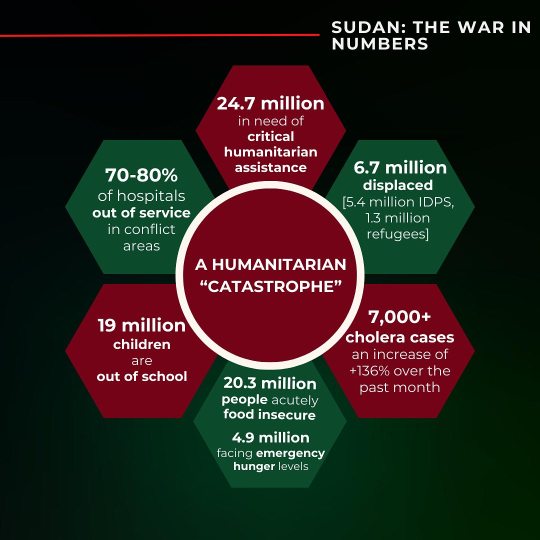
Transcript:
Sudan: the war in numbers
A humanitarian "catastrophe"
24.7 million in need of critical humanitarian assistance
70-80% of hospitals out of service in conflict areas
19 million children are out of school
20.3 million people acutely food insecure. 4.9 million facing emergency hunger levels
6.7 million displaced [5.4 million IDPS, 1.3 million refugees]
7,000+ cholera cases an increase of +136% over the past month
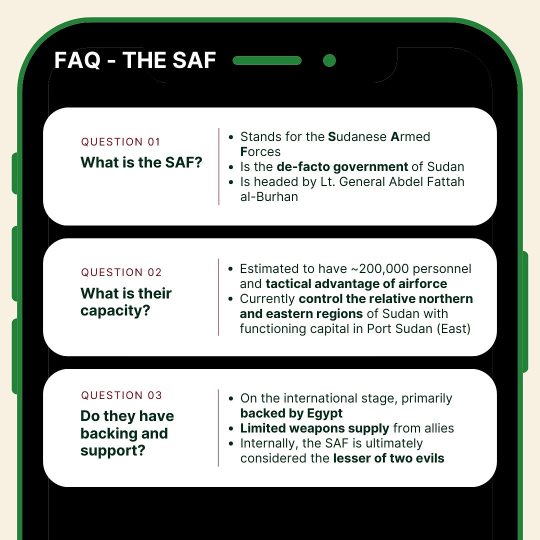
Transcript:
FAQ - THE SAF
QUESTION 01: What is the SAF?
Stands for the Sudanese Armed Forces
Is the de-facto government of Sudan
Is headed by Lt. General Abdel Fattah al-Burhan
QUESTION 02 What is their capacity?
Estimated to have ~200,000 personnel and tactical advantage of airforce
Currently control the relative northern and eastern regions of Sudan with functioning capital in Port Sudan (East)
QUESTION 03 Do they have backing and support?
On the international stage, primarily backed by Egypt
Limited weapons supply from allies
Internally, the SAF is ultimately considered the lesser of two evils
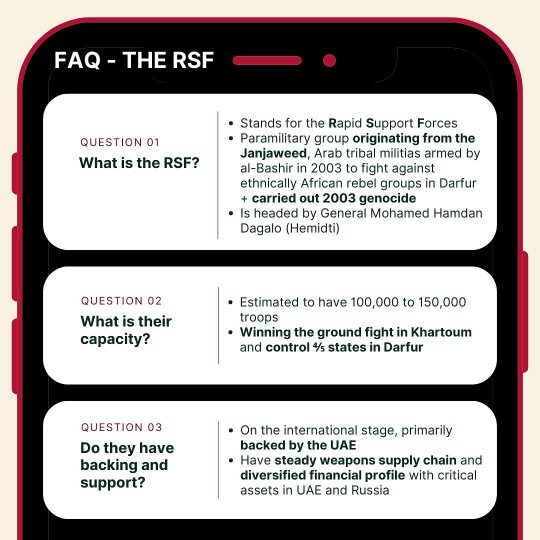
Transcript:
FAQ - THE RSF
QUESTION 01 What is the RSF?
Stands for the Rapid Support Forces
Paramilitary group originating from the Janjaweed, Arab tribal militias armed by al-Bashir in 2003 to fight against ethnically African rebel groups in Darfur + carried out 2003 genocide
Is headed by General Mohamed Hamdan Dagalo (Hemidti)
QUESTION 02 What is their capacity?
Estimated to have 100,000 to 150,000 troops
Winning the ground fight in Khartoum and control 4/5 states in Darfur
QUESTION 03 Do they have backing and support?
On the international stage, primarily backed by the UAE
Have steady weapons supply chain and diversified financial profile with critical assets in UAE and Russia
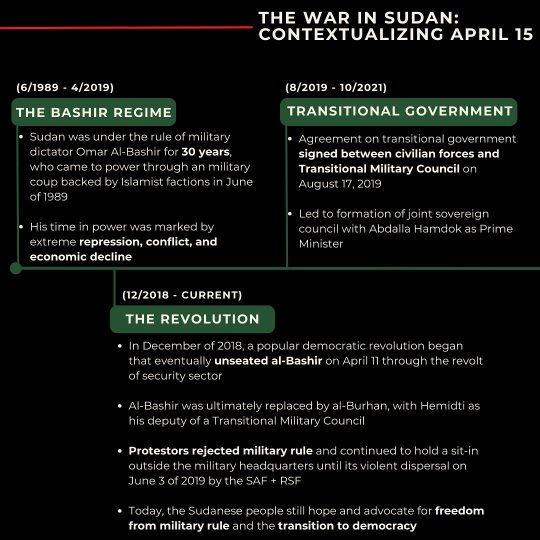
Transcript:
THE WAR IN SUDAN: CONTEXTUALIZING APRIL 15
(6/1989 - 4/2019) THE BASHIR REGIME
Sudan was under the rule of military dictator Omar Al-Bashir for 30 years, who came to power through an military coup backed by Islamist factions in June of 1989
His time in power was marked by extreme repression, conflict, and economic decline
(12/2018 CURRENT) THE REVOLUTION
In December of 2018, a popular democratic revolution began that eventually unseated al-Bashir on April 11 through the revolt of security sector
Al-Bashir was ultimately replaced by al-Burhan, with Hemidti as his deputy of a Transitional Military Council
Protestors rejected military rule and continued to hold a sit-in outside the military headquarters until its violent dispersal on June 3 of 2019 by the SAF + RSF
Today, the Sudanese people still hope and advocate for freedom from military rule and the transition to democracy
(8/2019-10/2021) TRANSITIONAL GOVERNMENT
Agreement on transitional government signed between civilian forces and Transitional Military Council on August 17, 2019
Led to formation of joint sovereign council with Abdalla Hamdok as Prime Minister
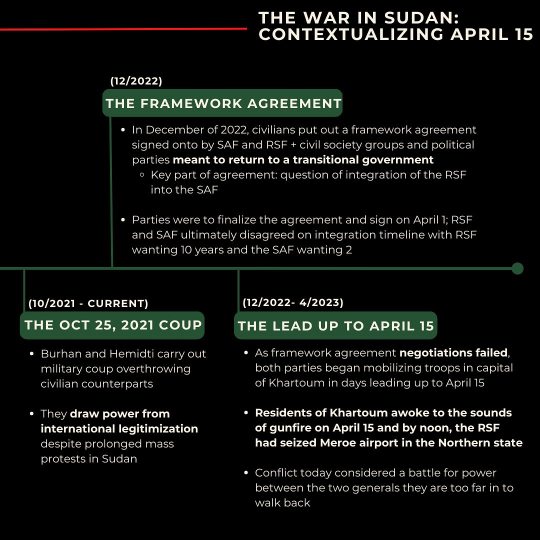
Transcript:
(10/2021 CURRENT)THE OCT 25, 2021 COUP
Burhan and Hemidti carry out military coup overthrowing civilian counterparts
They draw power from international legitimization despite prolonged mass protests in Sudan
(12/2022) THE FRAMEWORK AGREEMENT
In December of 2022, civilians put out a framework agreement signed onto by SAF and RSF + civil society groups and political parties meant to return to a transitional government
Key part of agreement: question of integration of the RSF into the SAF
Parties were to finalize the agreement and sign on April 1; RSF and SAF ultimately disagreed on integration timeline with RSF wanting 10 years and the SAF wanting 2
(12/2022-4/2023) THE LEAD UP TO APRIL 15
As framework agreement negotiations failed, both parties began mobilizing troops in capital of Khartoum in days leading up to April 15
Residents of Khartoum awoke to the sounds of gunfire on April 15 and by noon, the RSF had seized Meroe airport in the Northern state
Conflict today considered a battle for power between the two generals they are too far in to walk back

Transcript:
FRAMING ALLIANCES
Sudanese Armed Forces (SAF):
Egypt
Israel (Foreign Ministry)
Islamists
Iran
Saudi Arabia
Ukraine (SOF)
Armed Groups
Rebel groups that had taken up arms against the central government in the Bashir Era are forced to ally with the SAF due to the RSF's ethnic cleansing campaign. They include:
Justice and Equality Movement (Gibril Ibrahim)
Sudan Liberation Movement/Army (Minni Minawi)
Gathering of Sudan Liberation Forces (Abdallah Yahya)
Rapid Support Forces (RSF):
Israel (Mossad)
Libya (Khalifa Haftar)
United Arab Emirates
Central African Republic
Russia (Wagner Group)
Chad
Arab Tribal Leaders
Arab tribal leaders across the Western region of Darfur have pledged their allegiance and support to the RSF, with members of the tribes across the Sahel crossing into Sudan to join the RSF's assault as well.
Key tribes include: Beni Halba, Tarjam, Habaniya, Fallata, Misseriya, Taaysha, Rizeigat
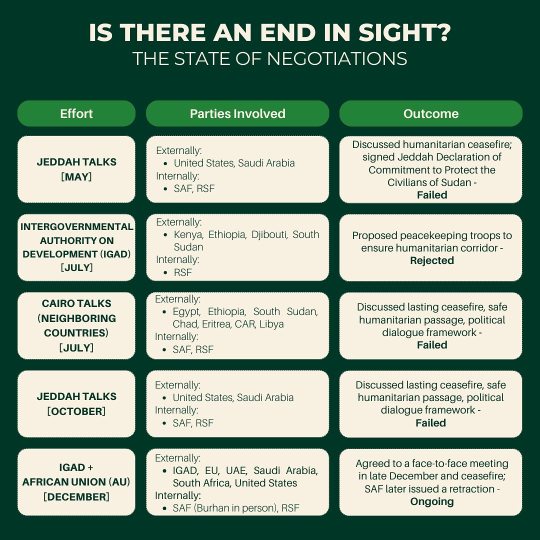
Transcript:
IS THERE AN END IN SIGHT?
THE STATE OF NEGOTIATIONS
Effort: JEDDAH TALKS [MAY]
Parties involved: Externally: United States, Saudi Arabia Internally: SAF, RSF
Outcome: Discussed humanitarian ceasefire; signed Jeddah Declaration of Commitment to Protect the Civilians of Sudan - Failed
Effort: INTERGOVERNMENTAL AUTHORITY ON DEVELOPMENT (IGAD) [JULY]
Parties Involved: Externally: Kenya, Ethiopia, Djibouti, South Sudan Internally: RSF
Outcome: Proposed peacekeeping troops to ensure humanitarian corridor - Rejected
Effort: CAIRO TALKS (NEIGHBORING COUNTRIES) [JULY]
Parties Involved: Externally: Egypt, Ethiopia, South Sudan, Chad, Eritrea, CAR, Libya Internally: SAF, RSF
Outcome: Discussed lasting ceasefire, safe humanitarian passage, political dialogue framework - Failed
Effort: JEDDAH TALKS [OCTOBER]
Parties Involved: Externally: United States, Saudi Arabia Internally: SAF, RSF
Outcome: Discussed lasting ceasefire, safe humanitarian passage, political dialogue framework - Failed
Effort: IGAD + AFRICAN UNION (AU) [DECEMBER]
Parties Involved: Externally: IGAD, EU, UAE, Saudi Arabia, South Africa, United States Internally: SAF (Burhan in person), RSF
Outcome: Agreed to a face-to-face meeting in late December and ceasefire; SAF later issued a retraction - Ongoing
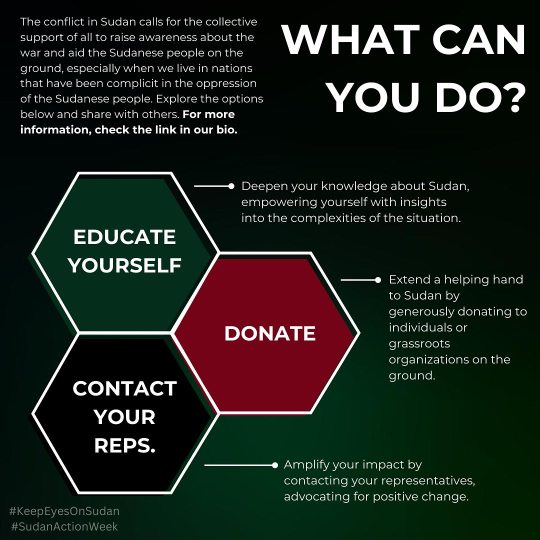
Transcript:
The conflict in Sudan calls for the collective support of all to raise awareness about the war and aid the Sudanese people on the ground, especially when we live in nations that have been complicit in the oppression of the Sudanese people. Explore the options below and share with others. For more information, check the link in our bio.
WHAT CAN YOU DO?
EDUCATE YOURSELF
Deepen your knowledge about Sudan, empowering yourself with insights into the complexities of the situation.
DONATE
Extend a helping hand to Sudan by generously donating to individuals or grassroots organizations on the ground.
CONTACT YOUR REPS.
Amplify your impact by contacting your representatives, advocating for positive change.
#sudan#keep eyes on sudan#KeepEyesOnSudan#Sudan Action Week#SudanActionWeek#i hope the way i formatted it is good#i saw a few hours ago that rsf retreated from wad madani outskirts
370 notes
·
View notes
Text
What is happening in Sudan: A Timeline
2018 - In December 2018, the economic decline in Sudan, along with escalating costs of bread and fuel, the unavailability of money in banks and ATMs, served as significant catalysts prompting Sudanese people to protest all over the country against the regime of Omar Al-Bashir. (known as Kezan). Omar Al-Bashir's 30-year dictatorship was marked by a reign of oppression and atrocities. His administration perpetrated heinous acts, including the Darfur genocide and the civil war in South Sudan. In these conflicts, they deployed militiamen (Janjaweed, RSF now) who engaged in a range of crimes, from ethnic cleansing to acts of rape and looting, leaving a devastating impact on these regions and others.
2019 - After four months of protests, in April 2019, a coup led by the military against Omar Al-Bashir was declared. Al-Bashir was arrested, and a TWO YEAR Transitional Military Council (TMC) was announced until a new CIVILIAN administration is established. Even after overthrowing the regime of Omar Al-Bashir, the Sudanese people didn't trust the military due to the presence of Kezan among them. So the people decided to conduct a sit-in at the army headquarters in Khartoum, the capital and kept protesting in other states for a civilian-led government. The sit-in continued for 2 months. In June 2019, during the last ten nights of Ramadan, the TMC and the Rapid Support Forces (RSF) initiated a lethal assault on civilians, resulting in death of over a 100+ people, 600+ injured 40 bodies found at the shore of the Nile River and countless cases of rape and sexual assault. That attack is now known as the massacre of the army headquarters (مجزرة القياده العامة). During that period, the TMC and RSF imposed a media blackout in Khartoum by shutting down the internet to commit their crimes in the dark. In the face of adversity and in honor of the fallen martyrs of the massacre, the resilience of the Sudanese people intensified, triggering marches that drew millions and widespread acts of civil disobedience. World wide marches for Sudan were also organized by the Sudanese diaspora. Since 2019, persistent protests have called for a civilian-led government free from Kezan and RSF influence. Unfortunately, despite the efforts of numerous organizations advocating for this change, it has not been done. For five years, the call for freedom continued, during this time, clashes and atrocities by the RSF and TMC persisted. Incidents of killing civilians, looting houses, rape, sexual assault, and various other crimes throughout Sudan.
2023 - The conflicts in Sudan began on April 15th, escalated into a full-scale war between the Sudanese Army Forces (SAF) and the Rapid Support Forces (RSF), persisting for the past 7 months. These clashes emerged after months of escalating tension between the two leaders locked in a power struggle. The ongoing fighting has disrupted the envisaged transition to complete civilian rule. Established in 2013 by the former dictator Omar al-Bashir, the RSF originated from the notorious Janjaweed militia. This is the same group that carried out war crimes in the Darfur region (Darfur genocide) and is responsible for the killing of civilian protesters during the 2019 Revolution. They are armed and funded by the UAE, possibly with other foreign interventions exacerbating the war.
All underlined text have links!
29 notes
·
View notes